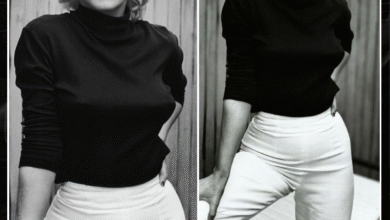The Tragic Price of Glamour: Marilyn Monroe Reveals the Hidden Agony of Being Famous
OPINION: This article may contain commentary which reflects the author's opinion.
Marilyn Monroe, one of Hollywood’s most enduring icons, captivated audiences with her beauty, charm, and vulnerability. While she is often remembered for her roles in films like Gentlemen Prefer Blondes and How to Marry a Millionaire, Monroe’s relationship with fame was complex and fraught with personal challenges. In a 1962 interview with Life magazine, Monroe opened up about the darker aspects of fame, sharing her frustrations with its invasive nature and the emotional toll it took on her. These reflections, often poignant and raw, offer a deeper understanding of Monroe’s struggles beyond the glittering exterior of Hollywood stardom.
The Invasive Nature of Fame
Monroe’s experience with fame was shaped by its dehumanizing effects, something she expressed candidly in her interviews. She once said, “When you’re famous you kind of run into human nature in a raw kind of way. It stirs up envy, fame does.” Monroe recognized how fame could expose her to societal envy and the resentment of others, a theme that runs throughout her reflections on the impact of celebrity status. She spoke of how fame also led to the loss of privacy, revealing that people felt entitled to treat her as an object of their curiosity and criticism. In her words, “People you run into feel that, well, who is she who does she think she is, Marilyn Monroe? They feel fame gives them some kind of privilege to walk up to you and say anything to you, you know, of any kind of nature and it won’t hurt your feelings. Like it’s happening to your clothing.”
This loss of privacy, where her personal boundaries were regularly disregarded, marked the beginning of her estrangement from the very thing that had catapulted her to fame. For Monroe, fame was not just a blessing but also a burden, often leaving her exposed to harsh judgment and the invasive gaze of the public.
Fame’s Psychological Toll
Monroe’s struggle with the psychological pressures of fame was reflected in her admission that “I think that when you are famous every weakness is exaggerated.” She elaborated on this by comparing the entertainment industry to a mother who, instead of nurturing a child who runs into danger, punishes them. Her comment, “This industry should behave like a mother whose child has just run out in front of a car. But instead of clasping the child to them, they start punishing the child,” illustrates the cruel irony she experienced, where her vulnerabilities were amplified, and her mistakes magnified. Rather than being offered compassion, Monroe often faced public scorn and scrutiny, deepening her insecurities.
The industry that celebrated her beauty and talent also held her to impossible standards, and Monroe felt the weight of this expectation. She once stated, “Fame has a special burden, which I might as well state here and now. I don’t mind being burdened with being glamorous and sexual. But what goes with it can be a burden.” This acceptance of her public image as a glamorous, sexual icon was tempered by the recognition that the pressures it created were immense. Monroe’s fame, it seemed, came at the cost of her peace of mind.
The Transitory Nature of Fame
Despite the overwhelming challenges, Monroe remained philosophical about fame’s fleeting nature. In a reflection that shows her understanding of fame’s transience, she remarked, “Fame will go by, and, so long, I’ve had you fame. If it goes by, I’ve always known it was fickle. So at least it’s something I experienced, but that’s not where I live.” Monroe’s ability to detach herself from the idea of fame as her core identity reveals a deeper wisdom. While fame provided her with the platform to achieve success, she understood its impermanence and, ultimately, its inability to define her true self.
A Childhood Marked by Trauma and Insecurities
To fully understand the complexity of Monroe’s views on fame, it’s essential to consider the traumatic events of her childhood. Born Norma Jeane Mortenson in 1926, she faced abandonment by her father at a young age, and her mother was institutionalized for mental health issues. Monroe spent much of her childhood in foster care, an experience that contributed to her lifelong insecurities. Her need for love and validation, shaped by early emotional neglect, played a significant role in her later struggles with self-worth and her relationships.
As she rose to fame, Monroe became the embodiment of the “dumb blonde” stereotype, a label that both benefited her career and constrained her artistic potential. While her image made her a major star, it also created a dichotomy between her public persona and her private reality. She felt limited by the roles she was offered and frustrated by the industry’s failure to recognize her full range of talent. This tension between her public image and her desire to be taken seriously as an actress added another layer to her complex relationship with fame.
The Broader Implications of Monroe’s Experience
Monroe’s reflections on fame resonate with broader discussions on the psychological toll of celebrity culture. The invasive nature of fame, the objectification of public figures, and the expectations placed on them are issues that continue to affect contemporary celebrities. Monroe’s experiences foreshadow the challenges many modern stars face today—challenges that include maintaining privacy, dealing with unrealistic public expectations, and coping with the personal toll of constant scrutiny.
Her story also sheds light on the deeper human cost of fame. While celebrities are often seen as privileged, Monroe’s reflections show how fame can exacerbate emotional vulnerabilities, particularly when there is a disconnect between public persona and private self. Monroe’s legacy, as both an actress and a symbol of beauty, continues to offer insights into the complexities of fame—insights that remain relevant in today’s celebrity-driven world.
Conclusion: Marilyn Monroe’s Lasting Legacy
Marilyn Monroe’s reflections on the dark side of fame reveal a woman who, despite her public success, was burdened by the pressures and insecurities that fame can bring. Her candid views, shared through powerful quotes and personal anecdotes, offer a rare window into the struggles of living in the spotlight. Monroe’s experiences resonate with those who understand that fame, while alluring, can often come at a deep emotional cost. Her ability to reflect on these challenges with a sense of detachment from her fame speaks to her wisdom, and her legacy continues to influence both the entertainment industry and the way we view celebrity culture today.



